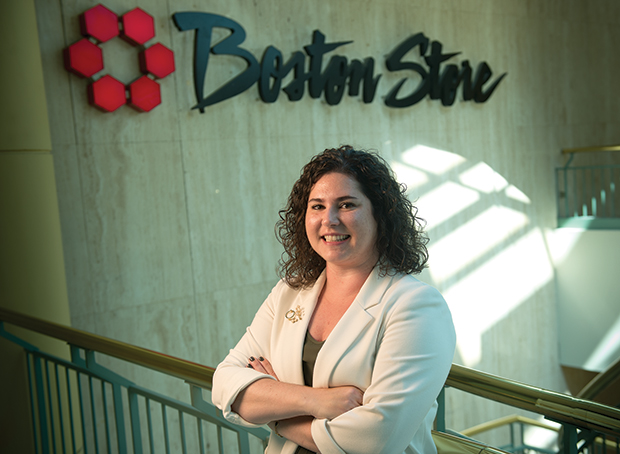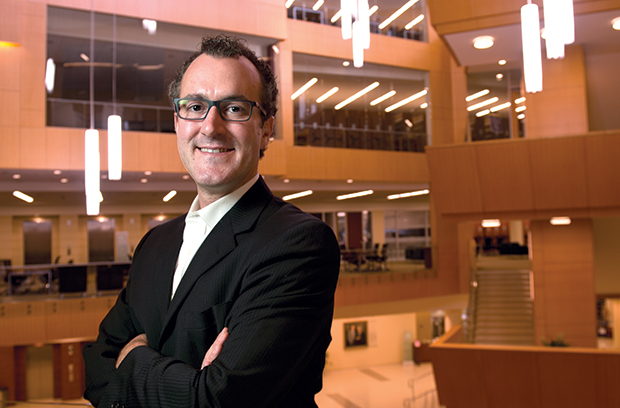The Pros of Pro Bono: New rule helps legal teams fill need for civil legal aid
By: Erika Strebel, [email protected]//August 28, 2017//
The Pros of Pro Bono: New rule helps legal teams fill need for civil legal aid
By: Erika Strebel, [email protected]//August 28, 2017//

Once a month, Rebecca Rapp, general counsel at Great Lakes Higher Education Corporation & Affiliates, travels with several attorneys at her company to do volunteer work at a four-hour legal clinic in a neighborhood on Madison’s north side. She and her peers offer limited-scope representation on civil matters to people who cannot afford a lawyer.
“It’s just great to be able to provide this service,” said Rapp. “And it’s also great for our team. It’s a shared experience.”
But one member of her legal team always had to be left behind each month. Licensed in Minnesota rather than Wisconsin, he was barred by court rules in Wisconsin from taking part in the pro bono project. A change, though, is now brushing those restrictions aside.
Wisconsin has special court rules that apply to registered in-house counsel — a term referring to lawyers who are admitted to the bar in another state and practice law in Wisconsin for a single client. Until recently, those restrictions had prevented registered in-house counsel from doing pro bono work for anyone other than “qualified clients of a legal-service program.”
All that changed on Jan. 1, when the restrictions were taken off the books.
Now all the attorneys at Great Lakes can take part in pro bono work.
“It’s great for two reasons,” said Rapp. “One, he has a lot of skills and talents as an attorney, so he can share that with people who are unable to afford an attorney on their own. It’s also great from a team-building perspective because to have some people who can participate and some who cannot, that creates a kind of division. It’s certainly not the goal for something like this.”
The Wisconsin Supreme Court voted last April to strike down that barrier for in-house counsel, becoming the 13th state to do so. Amy Ruhig, assistant general counsel at The Bon-Ton Stores Inc., was part of the team at the Wisconsin Chapter of the Association of Corporate Counsel that headed up the work with the help of the State Bar of Wisconsin.
“We were really excited for the outcome, very happy that the support was there from our justices to retool that rule a little bit and make sure that all of our in-house practitioners have the opportunity to provide that support,” she said. “The need is so great, and there’s lots of spectacular in-house attorneys that are registered but not licensed in our state.”
Noting that it’s only been about nine months since the new rule took effect, Ruhig predicted that more and more legal departments in Wisconsin will be taking advantage of it in the near future.
That’s especially likely, she said, in light of the increasing number of out-of-state lawyers she is seeing brought into the state.
“Since the rule went down, law departments continue to expand their pro bono efforts and look for ways to give back to the communities they serve, this being one way that attorneys are positioned different than general community involvement that most organizations have,” Ruhig said.
Since at least 2012, Association of Corporate Counsel’s national arm has been looking into how different state rules treat out-of-state corporate counsel. Ruhig and her team at the ACC’s Wisconsin chapter found that part of the trouble with the state’s old rule was in its use of the phrase “qualified clients of a legal-service program”.
Ethics counsel and others believed the meaning was unclear. Attempts to find a better reason for the former restriction proved fruitless.
The proposal was backed by general counsel from firms around the state, including Madison-based CUNA Mutual Group and Milwaukee-based Rockwell Automation. Law firms, including Reinhart Boerner Van Dueren, weighed in with their support.
But the proposal wasn’t without opposition. The Board of Bar Examiners, for instance, warned that because registered in-house attorneys were not licensed in Wisconsin, they might be held to lower standards and pose a risk to clients.
But those arguments did not sway the Wisconsin Supreme Court, which voted 5-2 to adopt the change.
Rapp said she sees no drawbacks to the decision.
“I just really commend the court for pursuing these avenues, from the limited scope representation to this rule allowing out-of-state attorneys to participate in pro bono,” she said. “There’s such a huge need for civil-legal services because, unlike criminal services, there’s no right to an attorney even though these cases have huge, profound impacts on people’s lives, their families, their homes, their livelihoods.”
Legal News
- History made in Trump New York trial opening statements
- Prosecutor won’t bring charges against Wisconsin lawmaker over fundraising scheme
- Republican Wisconsin Senate candidate says he doesn’t oppose elderly people voting
- Vice President Harris to reveal final rules mandating minimum standards for nursing home staffing
- Election workers fear threats to their safety as November nears
- Former law enforcement praise state’s response brief in Steven Avery case
- Eric Toney announces re-election bid for Fond du Lac County District Attorney
- Former Wisconsin Democratic Rep. Peter Barca announces new bid for Congress
- Republicans file lawsuit challenging Evers’s partial vetoes to literacy bill
- More human remains believed those of missing woman wash up on Milwaukee Co. beach
- Vice President Harris returning to Wisconsin for third visit this year
- Wisconsin joins Feds, dozens of states to hold airlines accountable for bad behavior
WLJ People
- Power 30 Personal Injury Attorneys – Russell Nicolet
- Power 30 Personal Injury Attorneys – Benjamin Nicolet
- Power 30 Personal Injury Attorneys – Dustin T. Woehl
- Power 30 Personal Injury Attorneys – Katherine Metzger
- Power 30 Personal Injury Attorneys – Joseph Ryan
- Power 30 Personal Injury Attorneys – James M. Ryan
- Power 30 Personal Injury Attorneys – Dana Wachs
- Power 30 Personal Injury Attorneys – Mark L. Thomsen
- Power 30 Personal Injury Attorneys – Matthew Lein
- Power 30 Personal Injury Attorneys – Jeffrey A. Pitman
- Power 30 Personal Injury Attorneys – William Pemberton
- Power 30 Personal Injury Attorneys – Howard S. Sicula









